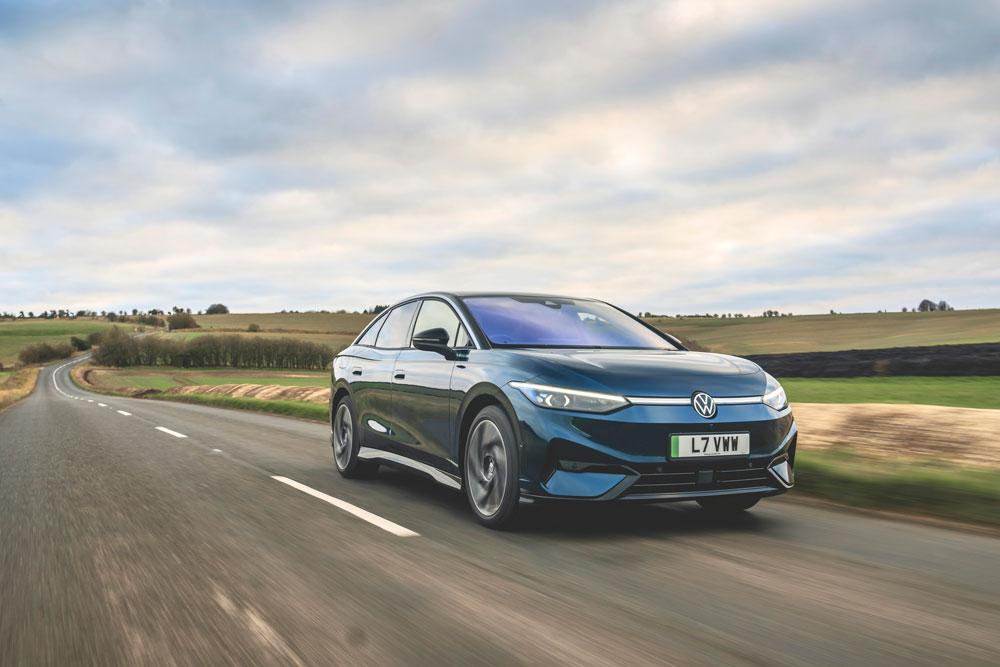Taking the fight to larger and more upmarket EVs, Richard Gooding finds that Volkswagen's ID offers fleet drivers a rounded, complete, and spacious package.
What is it?
At just under five metres in length, the ID 7 is the largest all-electric vehicle Volkswagen has launched. It’s also the most technologically advanced, spacious and the most luxurious. The newcomer is built on the same ‘MEB’ platform as its smaller ID-badged siblings. Available in both five-door fastback and ‘Tourer’ estate body styles, with rear or all-wheel drive, there is also a pair of performance-orientated GTX models.
What range does it have?
The rear-wheel drive ID 7 Pro Match has a 77kWh lithium-ion battery good for up to an official 383 miles of range. The ID 7 Pro Match S has a bigger 86kWh capacity which gives an official WLTP combined single charge driving distance of up to 437 miles, while the all-wheel drive ID 7 GTX can officially travel up to 366 miles on the same battery. All quoted battery capacities are net.
How long does it take to charge?
With a charging capacity of up to 175kW under what ‘optimum conditions’, the ID 7 Pro Match can replace up to 126 miles of battery range in around 10 minutes. A 10 to 80 per cent charge takes 30 minutes when plugged into a 150kW fast charger. The same refill takes just over an hour on a 50kW connection, and just over eight hours on a 7.4kW home wallbox.
Both the ID 7 Pro S Match and ID 7 GTX models benefit from an increased charge rate of up to 200kW DC. This means a 10 to 80 per cent refill takes around 26 minutes, and a 7.4kW connection takes nine hours for the same top-up. New charging and thermal management functions pre-condition the battery, bringing it to its optimum temperature ahead of a DC charging stop. It can then be charged at maximum power, reducing charging times. A heat pump costs £1,050 extra on all models.
How does it drive?
As you approach the ID 7, there is no mistaking that it shares the same slippery styling cues of VW’s smaller ID models, but its almost coupé-like roofline and gently curved lines help give it an understated elegance. The full-width light bars and illuminated Volkswagen emblems lend a more upmarket air.
Inside, premium quality materials are the best found on any ID to date, and the slim colour driver’s display sits in-between electronically controlled air vents. The 15-inch touchscreen ushers in a new version of Volkswagen’s infotainment software, AI-assisted functionality, and backlit heating controls, answering criticisms of previous ID models. With personalisation and shortcut button options, as well as a faster processing speed, the new set-up works well, although controlling those fancy vents through a screen is perhaps a step too far. Interior space is a highlight; with a-near three-metre wheelbase, rear passengers should be very
comfortable, and there is 532 litres of luggage space, increasing to 605 litres on the Tourer.
As you’d expect given its size and purpose, the ID 7 is a car suited to more relaxed cruising. Supremely refined, with accurate steering, decent pace, and ample levels of grip, while the ID 7 is impressively stable on the move, you can still have some driving fun. Regenerative braking is managed by the ‘B’ gear setting, which takes information from the radar to adaptively increase or decrease the amount of regen on offer.
What does it cost?
The ID 7 Pro Match is the entry level version of Volkswagen’s latest EV. Priced from £51,550, key features include 19-inch alloy wheels, LED matrix headlights, keyless entry, augmented reality head-up display, front massage seat function, navigation, three-zone climate control with rear control panel, area and rear view cameras, rear privacy glass and sensor-controlled opening and closing of the rear hatch.
The £55,450 ID 7 Pro S Match largely differs in its bigger battery capacity and increased charging speed, but the £61,980 ID 7 GTX offers 20-inch alloy wheels, sports-styled bumpers, an adaptive chassis control system, heated front and rear seats (with ventilation and massage functions for passengers in the front), and a 700W, 12-speaker Harman Kardon premium
sound system.
The ID 7 Tourer models are available for around a £700 premium over the fastback models with prices from £52,240 (Pro Match), £56,140 (Pro S Match) and £62,670 (GTX).
How much does it cost to tax?
As with all electric cars, every Volkswagen ID 7 model is currently exempt from VED charges in the first and subsequent years of registration. The 2024-2025 Benefit In Kind (BIK) value is two per cent.
Why does my fleet need one?
Offering Tesla Model S levels of interior space and practicality at a Model 3’s price point, the Volkswagen ID 7 impresses with its blend of premium materials, digital technology and levels of refinement. Fleet drivers should find the ID 7 accomplished, upmarket, and fully realised, making it Volkswagen’s most impressive EV to date.

